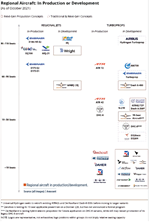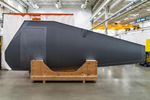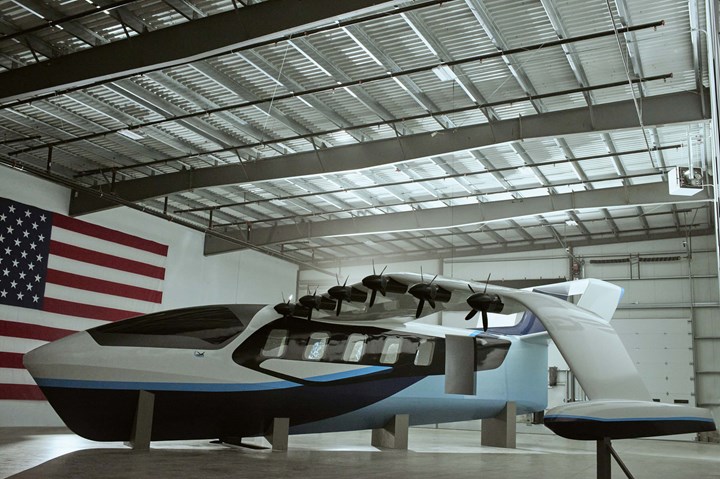Regent unveils full-scale seaglider mock-up, plans for expansion
Up to 600,000 square feet of new manufacturing and testing space is anticipated to fulfill $8 billion in global orders for the composite, all-electric maritime vehicle.
Regent Craft Inc. (Regent, North Kingstown, R.I., U.S.), a company developing electric seagliders that use composite materials for sustainable maritime transportation, has unveiled the full-scale mock-up of its human-carrying seaglider prototype — slated for flight testing in 2024 — as well as announced plans to expand its global headquarters in Rhode Island to include up to 600,000 square feet of new manufacturing and test facilities, which will begin fulfilling $8 billion in commercial orders by mid-decade.
Regent seagliders are a new category of maritime vehicle that combine the high speed of an airplane with the low operating cost of a boat. These all-electric, zero-emission vessels operate exclusively over water and leverage existing dock infrastructure to carry people and goods up to 180 miles with current battery technology.
Following successful flights of the company’s ¼ scale prototype last year, the mock-up represents a key next step in the build journey for Regent that will enable customers to begin interfacing with the full-scale vehicle design and think about the passenger experience. The company also announced it has tapped EP Systems (North Logan, Utah, U.S.) and MAGicALL (Camarillo, Calif., U.S.) as key vendors for the batteries and motors that will power the prototype’s all-electric distributed propulsion system.
“This mock-up, along with the announcement of our plans to build new state-of-the-art facilities, showcases our growth trajectory and our commitment to begin production as soon as possible,” Regent cofounder and CEO Billy Thalheimer says. “Our studies, based on publicly validated data, show that our seagliders serve a $11 billion market that we project to swell to as much as $25 billion as battery technology advances. The $8 billion in orders our company has already received from a variety of companies around the world reflect the need for fast, reliable and sustainable maritime transportation.”
The unveiling comes during an era of hyper-growth for the company which reports that it has already procured more than $50 million in funding since its launch just two years ago. In the past few months, Regent has announced the appointment of aerospace visionaries David Neeleman, cofounder of Breeze Airways, JetBlue and Azul Airlines, and Dennis Muilenburg, former CEO of The Boeing Company, to its board of advisors; announced strategic investments from Japan Airlines, Lockheed Martin and Japan’s Yamato Holdings; and continues to build its order book to more than 500 seagliders from a swath of companies including Brittany Ferries, FRS (Germany), Mesa Airlines, Ocean Flyer (New Zealand) and Mokulele Airlines.
As it looks ahead to the future and brings its products to market, Regent has also confirmed that Southern Airways/Mokulele Airlines (Hawaii, U.S.) will receive the first commercial passenger seagliders once they hit the market, promising to increase a commitment to serving coastal and island residents around the globe.
Regent expects its first commercial Viceroy seagliders to enter service by mid-decade.
Related Content
-
Plant tour: Joby Aviation, Marina, Calif., U.S.
As the advanced air mobility market begins to take shape, market leader Joby Aviation works to industrialize composites manufacturing for its first-generation, composites-intensive, all-electric air taxi.
-
A new era for ceramic matrix composites
CMC is expanding, with new fiber production in Europe, faster processes and higher temperature materials enabling applications for industry, hypersonics and New Space.
-
Plant tour: Middle River Aerostructure Systems, Baltimore, Md., U.S.
The historic Martin Aircraft factory is advancing digitized automation for more sustainable production of composite aerostructures.

















